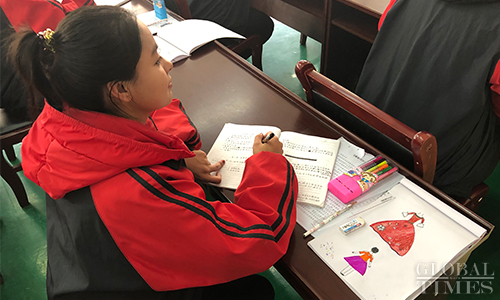HOME >> CHINA
Xinjiang white paper justifies training centers
By Liu Xin and Bai Yunyi Source:Global Times Published: 2019/8/16 10:12:22

A trainee in a training center in Kashi, Northwest China's Xinjiang Uyghur Autonomous Region, takes an apparel design class in February. Photo: Liu Xin/GT

A media group from Indonesia and Malaysia talks to trainees in an education and vocational training center in Hotan, Northwest China's Xinjiang Uyghur Autonomous Region in February. Photo: Liu Xin/GT
China on Friday released a white paper on vocational education and training in Northwest China's Xinjiang Uyghur Autonomous Region, clarifying the legal basis for the training centers and declaring a key victory against terrorism and extremism through these centers.
The white paper includes six parts - urgent need for education and training, law-based education and training, content of education and training, protection of trainees' basic rights, remarkable results in education and training, and experience in countering extremism.
The release marks the third white paper on Xinjiang this year. China released a white paper, "The Fight Against Terrorism and Extremism and Human Rights Protection in Xinjiang," on March 18 and another white paper, "Historical Matters Concerning Xinjiang," on July 21.
"China released the white papers to provide a full picture to the international community on its Xinjiang policies amid attempts by some Western media and anti-China forces to use the issue to stir trouble and contain China," Qian Jinyu, executive dean of the Human Rights Institution of Northwest University of Political Science and Law in Shaanxi Province, told the Global Times.
The white papers reveal the spirit of innovation, and that the rule of law has been fully implemented in China's policies in Xinjiang, Qian said.
Xu Jianying, a research fellow at the Institute of China's Borderlands of the Chinese Academy of Social Sciences, told the Global Times that one of the key points in Friday's white paper is the legal basis for organizing the training centers. The Chinese government, for the first time, gives an open and comprehensive explanation on the legal basis of the training centers, which will further promote China's policies in Xinjiang.
"The white paper also shows China's responsible attitude toward its work in counter-terrorism and de-radicalization," Xu said.
Legal basis
Terrorism and extremism have long existed in Xinjiang. Incomplete statistics show that from 1990 to the end of 2016, separatists, religious extremists and terrorists plotted and launched thousands of terrorist attacks, including bombings, assassinations, arson and riots, killing large numbers of innocent people and hundreds of police officers and caused immeasurable damage to property.
Education and training in Xinjiang is practiced in line with the requirements of the rule of law in China. It also reflects the ideas and principles of counter-terrorism and de-radicalization as practiced by the international community, the white paper said.
It listed the legal basis - including the Counter-terrorism Law of the People's Republic of China (PRC), the Measures of the Xinjiang Uygur Autonomous Region on Implementing the Counter-terrorism Law of the PRC and the Regulations of the Xinjiang Uygur Autonomous Region on De-radicalization.
The white paper clarified the three categories of trainees at the centers and explained the legal procedures of how the centers are run.
The trainees at the centers fall under three categories:
Those who were incited, coerced or induced into participating in terrorist or extremist activities, or people who participated in terrorist or extremist activities in circumstances that were not serious enough to constitute a crime.
Those who were incited, coerced or induced into participating in terrorist or extremist activities, or people who participated in terrorist or extremist activities that posed a real danger but did not cause actual harm, whose subjective culpability was not deep, who acknowledged their offenses and were contrite about their past actions, and thus do not need to be sentenced or can be exempted from punishment, and who have demonstrated the willingness to receive training. .
Those who were convicted and received prison sentences for terrorist or extremist crimes, and after serving their sentences, have been assessed as still posing a potential threat to society, and who have been ordered by people's courts to be educated at the centers in accordance with the law.
Qian noted the importance of educating women on laws, as many married female trainees have little knowledge of their basic rights.
"Some men in Xinjiang used to divorce their wives after they said 'Talaq' three times to the wife [Triple Talaq, a type of instant divorce in Islam]. Women were beaten by their husbands. After learning about the law, they know their rights are protected in marriage," Qian said.
The training centers also help these women improve the economic status of their families. With the vocational skills they have learned, they can earn respect from their husbands, Qian said.
Refuting rumors
For a long time, Western media and anti-China forces have hyped China's human rights "violations," "mistreating" trainees at the centers, and even "depriving" them of using their own ethnic language.
Xu told the Global Times that the white paper also addresses concerns from the international community.
As extremism has been effectively contained in Xinjiang, and no terrorist incidents have occurred in Xinjiang for nearly three years since the education and training started, the white paper offers facts about Xinjiang which would help the world better understand the policies, analysts said.
The vocational education and training centers provide trainees with residential vocational training free of charge, and issue certificates of completion when they reach the expected criteria. After graduating, the trainees can choose their own jobs, or employment can be arranged for them with the assistance of relevant authorities, the paper said.
The white paper also reiterated that the basic rights of the trainees have been protected and the training center programs are aimed to help trainees to break free from ideas of terrorism and religious extremism and that it has never targeted any specific region, ethnic group or religion.
Under the premise of respecting ethnic groups' rights to use their own ethnic spoken and written languages, lectures on standard Chinese have been given to trainees to help them learn about science and technology, acquire vocational skills, seek work in other locations, communicate with other ethnic groups, and adapt better to modern living.
The training centers fully respect and protect the customs and habits of trainees hailing from different ethnic groups as well as their right to use their own language. Rules at the centers, curriculum and menus use local ethnic languages and standard Chinese.
The white paper also noted the trainees' freedom of religious belief has always been respected.
According to China's laws, no religious activity should be organized outside religious institutions and venues. The centers practice separation of education and religion in management, which means trainees should not organize or take part in religious activities at the centers, but they can choose whether to legally do so at home, the white paper said.
The UN's Plan of Action to Prevent Violent Extremism says poverty, unemployment, lack of job opportunities, low education levels and violent extremist groups using religion, differences between ethnic groups, and other reasons have helped create violent extremism.
The plan also suggests broadening responses, engaging earlier, and addressing the influences of violent extremism to counter terrorism. Preventive measures are also needed to complement the countering of violent extremism.
Great achievements
The training centers have helped rescue people from extremism, safeguarding the fundamental interests of all ethnic groups.
Thanks to these preventive measures, Xinjiang has experienced changes in its social environment. A healthy atmosphere is spreading, while evil influences declining. As the infiltration of religious extremism has been curbed, public order and security have returned, where equality, solidarity and harmony among ethnic groups and religions have prevailed, and people are enjoying peace and stability, the paper said.
Through measures such as vocational education and training, Xinjiang has achieved key victories in countering terrorism and extremism, which deserves the understanding and respect of the international community, it said.
Since December 2018, nearly 1,000 people have visited Xinjiang. They include foreign diplomats to China, UN officials, Geneva-based senior diplomats of various countries, as well as more than 40 groups (or delegations) of people from political parties, civil society organizations, news media, and religious organizations of various countries, the paper said.
A number of foreign journalists who have conducted interviews at the education and training centers have published stories that reflect the true role of the centers and express their understanding, approval and support for the education and training programs in Xinjiang.
Some countries and organizations or individuals apply double standards in their approach to terrorism and extremism, which will in effect shield and incite terrorism and extremism, it said.
Posted in: SOCIETY